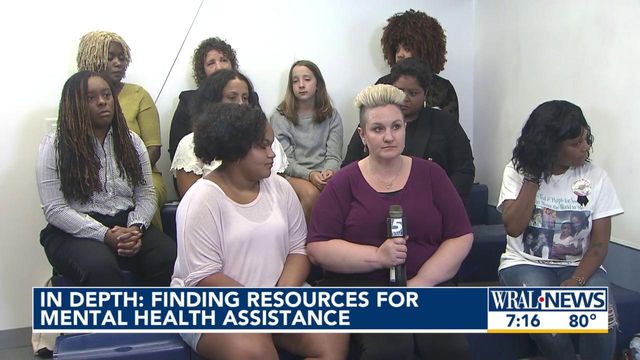'That could have been my child': Mom reflects on Wake County middle school student who took his own life
WRAL News spent more than an hour with the group comprised of kids, parents, doctors and advocates to discuss Austin Pendergrass' desperate act and the impact the pandemic has had on children.
Posted — UpdatedWRAL News spent more than an hour with the group comprised of kids, parents, doctors and advocates to discuss Austin’s desperate act and the impact the pandemic has had on children.
The group of 10 people also discussed youth mental health and suicide. It includes:
Finding mental health help for children
Parent Tiffany Benoit said her daughter Arianna Mindel-Benoit has been on a waiting list for two months to get care. The mother and daughter said they still have to wait another two months.
Benoit explained her reaction to last week’s news about Pendergrass.
“That could have been my child,” Benoit said. “My child has had those feelings before. She has those feelings still.”
Arianna has served as a powerful voice in the conversation around kids and metal health. When she was a seventh grader, she participated in “Pandemic Generation,” a WRAL documentary. The documentary looks at the struggles young people are experiencing, and the lack of help they're getting.
“I worry that we’re all going to be socially awkward, and we aren’t really going to know who we are or where we fit in and that might lead to a whole new road of mental health issues for the future,” Arianna said in April.
Benoit said she’s sought out different therapists between moms’ groups, trying to get suggestions and find treatment that accepts her insurance.
“It’s like, you think you have somebody and then you narrow it down by insurance and it’s like, they’re not accepting new patients,” Benoit said. “I’ve made phone calls, they’re not accepting children, they’re not accepting teens.”
Benoit said she had the feeling she might not be looking in the right place to find treatment for her daughter.
“It just feels like [there are] closed doors everywhere,” Benoit said. “And, I resort back to the moms’ groups and it’s daily that there are posts of people 6 [or] 7 years old all the way up to teens.
“Who can I take my child to for help? They need to talk to somebody. There’s a lot of suggestions, but it’s just a lot of closed doors.”
The shortage ripples into backlogs that affect the entire industry.
“There is help out there, but it’s not at the scale that people need,” Krempasky said. “It's not at the scale of the problem that we're experiencing.”
Krempasky said it is urgent for the county to scale up.
“Every day, there are people dying from mental illness,” Krempasky said. “We don’t always think about mental illness being a deadly disease, and a deadly series of diseases, but it very much is.”
Krempasky said there is not an easy solution to fix the problem.
“When you see all the different needs and coming at it from different angles, there isn’t a very clear, one size fits all [solution],” Krempasky said. “Again, it’s been a long standing, growing problem that’s happened over time.
“It’s going to take time to figure out the solutions to that as well. Again, it’s also been something that we haven’t wanted to talk about. It has been something that we haven't wanted or hadn't felt comfortable claiming that this is going on. It's been the silent epidemic. It's been the silent suffering. And, I think one of the silver linings of the pandemic is that people are starting to talk about their needs, their care and what the gaps are.”
Anxiety, depression rise among North Carolina children, study finds
In 2016, 7.6% of North Carolina children (ages 3-17) were diagnosed with depression or anxiety by a health care provider. In 2019, that number rose to 13.1%. In the most recent year we have data, 11.3% of kids and teens had a diagnosis of depression or anxiety in 2020.
In Depth With Dan
Related Topics
• Credits
Copyright 2024 by Capitol Broadcasting Company. All rights reserved. This material may not be published, broadcast, rewritten or redistributed.






